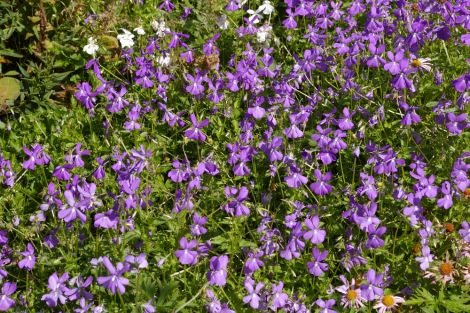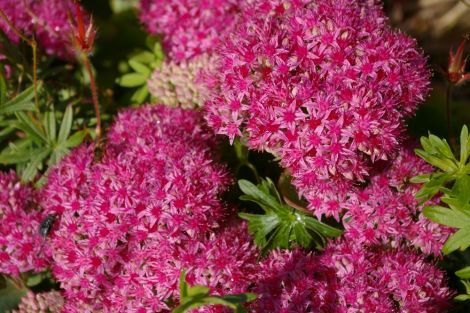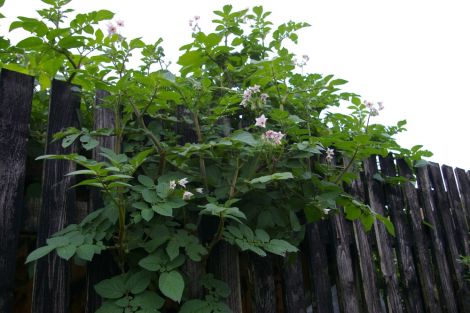Four Seasons / Four Seasons – Late Summer
Have you ever dreamed of, or searched for, the ideal weed killer? A weed killer that is virtually free of charge, contains no nasty chemicals, does no damage to the flora and fauna (apart from the weeds) of your garden and the environment at large? Search no more. I have not just one, but three to recommend to you.
I do realise that the above sounds like some highly dubious advertisement, falsely promising the earth and, in all likelihood, costing the earth. But please read on.
If you have a piece of weed-infested ground you would like to clear for planting or cultivation in the future, let nature do the work for you. It’s quite simple. Forget about black plastic mulch and use something much more pleasing to the eye. Establish a clump or two of suitably rampant, but shallow-rooted plants and let them do the work for you.
Lamium galeobdolon, also known as yellow archangel because of its handsome yellow deadnettle flowers, is an evergreen herbaceous ground cover plant that roots as it goes, bulldozing everything in its wake, including creeping buttercup.
I planted a small off-set in the shade of some trees and four years on it has covered several square yards. Dislodged recently with the help of a trowel, I’m left with perfectly clean soil, ready for re-planting.
Persicaria campanulata makes a tall, leafy thicket, topped with spikes of pretty pale pink bell flowers, before collapsing with the first frost to form an ever-thickening mulch that kills everything in its wake. The plant is shallow-rooted and can be rolled up like a carpet once it has done its job.
Viola cornuta is arguably the most handsome of the three with an endless supply of blue or white scented flowers. In fertile soil, it forms large, sprawling mats and sets copious amount of seed. Left to its own devices, it suppresses all but the most pernicious weeds, such as dock and couch grass. It will easily kill off other grasses and all annual weeds by overlaying them like a sow its piglets.
Become a member of Shetland News
Once your organic weed killers have done their job, simply move them on to the next weedy patch or compost them. Under no circumstances must you allow them to escape from your garden and wreak havoc elsewhere.
Isn’t this a fine day? Isn’t this a better day? That’s the verdict on the street whenever there isn’t a howling gale or torrential rain. There was a time when a “fine day” referred to blue skies and blazing sunshine. These days we have to be thankful for small mercies it seems – grey skies and a light drizzle.
My weather expectations are somewhat lowered once August is by. A day between weathers now and again has me in rapture, but this year I have my hopes pinned on the meteorological phenomenon known as Indian summer – preferably several weeks of it.
Perhaps Shetland’s Westside does get an unfair share of sunshine, perhaps Lea Gardens’ microclimate plays a role, but I don’t think this summer has been as bad as its much discussed reputation. All the hay is in – cured without a pinch of salt, a method usually adopted during damp summers. The sheep are clipped and everything is growing apace, apart from the carrots that is.
We are left with the great carrot mystery. Not a single one germinated from the first sowings at the very start of May. “Far too dry” was the definite verdict, but repeat sowings, one in the salad garden towards the end of the month, followed by a concerted effort involving several long rows in the vegetable plot a week later, proved inconclusive, and resulted in an estimated 16 carrots. It was a comfort to hear that several other Shetland gardeners had the same carrot experience this summer.
The rest of our vegetables have fared much better, and the other day I cooked the first “Pichelsteiner Eintopf” or “Diagonally through the Garden” as my aunt from Hamburg calls this fabulous summer hotpot. This meat-based broth (I use lamb necks) contains all the vegetables of the season, potatoes, turnips, carrots, broad beans, peas, courgettes, cauliflower, broccoli, etc. and is simmered slowly until just tender. With the cut up meat added at the end and sprinkled with chopped garden herbs, it tastes heavenly.
There’s a rather unusual tattie crop at Lea Gardens this year, several magnificent plants, tipped with large pink flowers, which spill out of our full-to-overflowing skip and cascade over the adjoining wooden fence. They are in fact the best “hanging basket” I’ve ever seen here and bear witness to the fact that potatoes prefer to grow at high altitudes. Not quite Andean in this case but nonetheless about two metres above ground level.
The skip is strictly reserved for organic waste, and has been on hire from Northwards for the best part of a decade. I’ve no idea how the tatties ended up in it, but I’ll make sure it won’t be collected before every last one has been dug up on the waste-not want-not principle.
Most plants readily adapt to a given environment, but sedums count amongst the most adaptable of all. Their water-storing foliage allows them to survive lengthy periods of drought in bone-dry soil, but most will also grow happily in damp ground. The leaves of all sedums are edible and I’m toying with the idea of novelty gourmet crops – once the lamium, persicaria, and viola have cleared sufficient ground…
Rosa Steppanova
Become a member of Shetland News
Shetland News is asking its many readers to consider paying for membership to get additional features and services: -
- Remove non-local ads;
- Bookmark posts to read later;
- Exclusive curated weekly newsletter;
- Hide membership messages;
- Comments open for discussion.
If you appreciate what we do and feel strongly about impartial local journalism, then please become a member of Shetland News by either making a single payment, or setting up a monthly, quarterly or yearly subscription.





























































